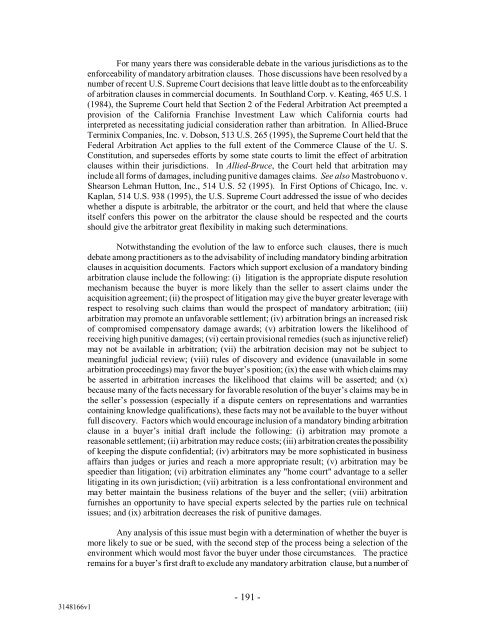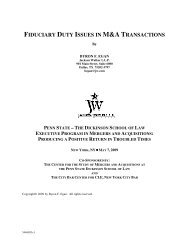asset acquisitions - Jackson Walker LLP
asset acquisitions - Jackson Walker LLP
asset acquisitions - Jackson Walker LLP
Create successful ePaper yourself
Turn your PDF publications into a flip-book with our unique Google optimized e-Paper software.
For many years there was considerable debate in the various jurisdictions as to theenforceability of mandatory arbitration clauses. Those discussions have been resolved by anumber of recent U.S. Supreme Court decisions that leave little doubt as to the enforceabilityof arbitration clauses in commercial documents. In Southland Corp. v. Keating, 465 U.S. 1(1984), the Supreme Court held that Section 2 of the Federal Arbitration Act preempted aprovision of the California Franchise Investment Law which California courts hadinterpreted as necessitating judicial consideration rather than arbitration. In Allied-BruceTerminix Companies, Inc. v. Dobson, 513 U.S. 265 (1995), the Supreme Court held that theFederal Arbitration Act applies to the full extent of the Commerce Clause of the U. S.Constitution, and supersedes efforts by some state courts to limit the effect of arbitrationclauses within their jurisdictions. In Allied-Bruce, the Court held that arbitration mayinclude all forms of damages, including punitive damages claims. See also Mastrobuono v.Shearson Lehman Hutton, Inc., 514 U.S. 52 (1995). In First Options of Chicago, Inc. v.Kaplan, 514 U.S. 938 (1995), the U.S. Supreme Court addressed the issue of who decideswhether a dispute is arbitrable, the arbitrator or the court, and held that where the clauseitself confers this power on the arbitrator the clause should be respected and the courtsshould give the arbitrator great flexibility in making such determinations.Notwithstanding the evolution of the law to enforce such clauses, there is muchdebate among practitioners as to the advisability of including mandatory binding arbitrationclauses in acquisition documents. Factors which support exclusion of a mandatory bindingarbitration clause include the following: (i) litigation is the appropriate dispute resolutionmechanism because the buyer is more likely than the seller to assert claims under theacquisition agreement; (ii) the prospect of litigation may give the buyer greater leverage withrespect to resolving such claims than would the prospect of mandatory arbitration; (iii)arbitration may promote an unfavorable settlement; (iv) arbitration brings an increased riskof compromised compensatory damage awards; (v) arbitration lowers the likelihood ofreceiving high punitive damages; (vi) certain provisional remedies (such as injunctive relief)may not be available in arbitration; (vii) the arbitration decision may not be subject tomeaningful judicial review; (viii) rules of discovery and evidence (unavailable in somearbitration proceedings) may favor the buyer’s position; (ix) the ease with which claims maybe asserted in arbitration increases the likelihood that claims will be asserted; and (x)because many of the facts necessary for favorable resolution of the buyer’s claims may be inthe seller’s possession (especially if a dispute centers on representations and warrantiescontaining knowledge qualifications), these facts may not be available to the buyer withoutfull discovery. Factors which would encourage inclusion of a mandatory binding arbitrationclause in a buyer’s initial draft include the following: (i) arbitration may promote areasonable settlement; (ii) arbitration may reduce costs; (iii) arbitration creates the possibilityof keeping the dispute confidential; (iv) arbitrators may be more sophisticated in businessaffairs than judges or juries and reach a more appropriate result; (v) arbitration may bespeedier than litigation; (vi) arbitration eliminates any "home court" advantage to a sellerlitigating in its own jurisdiction; (vii) arbitration is a less confrontational environment andmay better maintain the business relations of the buyer and the seller; (viii) arbitrationfurnishes an opportunity to have special experts selected by the parties rule on technicalissues; and (ix) arbitration decreases the risk of punitive damages.Any analysis of this issue must begin with a determination of whether the buyer ismore likely to sue or be sued, with the second step of the process being a selection of theenvironment which would most favor the buyer under those circumstances. The practiceremains for a buyer’s first draft to exclude any mandatory arbitration clause, but a number of3148166v1- 191 -
















